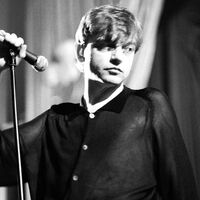Mark E. Smith: Difference between revisions
No edit summary |
No edit summary |
||
| Line 1: | Line 1: | ||
[[Category:Influences on Morrissey - Music]] | [[Category:Influences on Morrissey - Music]] | ||
[[File:Mark E. Smith.jpg | 200px | right | thumb |Mark E. Smith]] | |||
==Relevance== | ==Relevance== | ||
{{Page | {{Page | ||
Latest revision as of 12:10, 7 April 2023
Relevance
Mentioned In
Discogs Information
Profile
British singer, songwriter and frontman of the post-punk band, The Fall.
Born: 5th March 1957, Salford, Lancashire, England. Died: 24th January 2018, aged 60, from lung and kidney cancer.
External Links
Wikipedia Information
 |
Mark Edward Smith (5 March 1957 – 24 January 2018) was an English singer-songwriter. He was the lead vocalist, lyricist and only constant member of the post-punk group The Fall. Smith formed the band after attending the June 1976 Sex Pistols gig at the Lesser Free Trade Hall in Manchester and was its leader until his death. During their 42-year existence, the Fall's line-up included some sixty musicians, with whom Smith released 32 studio albums and numerous singles and EPs. Smith had a difficult and complex personality and was a long-term alcoholic. He was known for his biting and targeted wit, evident in interviews, for which he was much in demand by music journalists throughout his career. He was suspicious of the trappings of fame and largely avoided socialising with people associated with the music scene, including other Fall members. The dark and sardonic aspect of his personality often appears in his lyrics; he especially derided music industry people. Smith's approach to music was unconventional and he did not have high regard for musicianship, stating that "rock & roll isn't even music really. It's a mistreating of instruments to get feelings over." The Fall are regarded as one of the most important and influential post-punk bands of the 1980s, 1990s, and 2000s. Although Smith was difficult to work with, he was revered by fans and critics, and was described as a "strange kind of antimatter national treasure."
